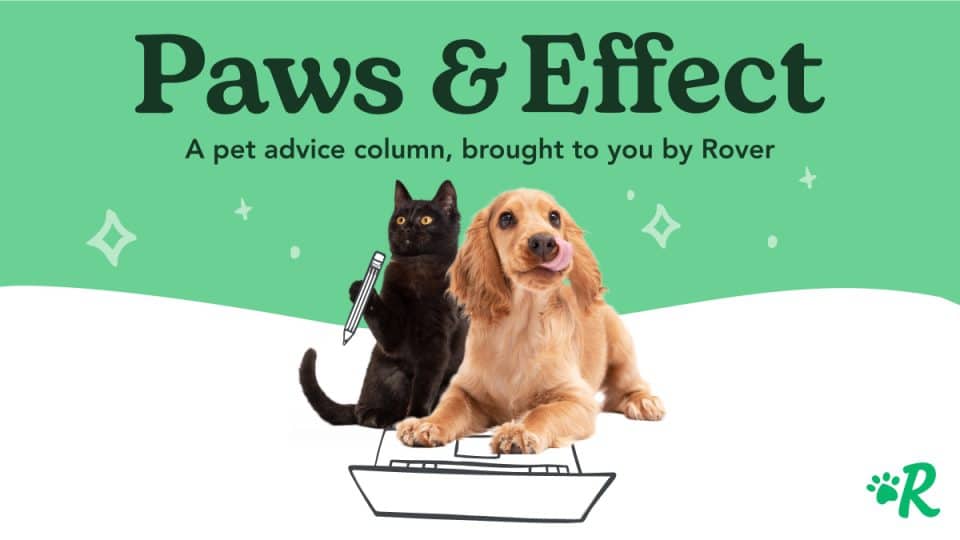Welcome to Paws and Effect, a pet expert advice column penned by longtime Rover contributor and award-winning pet writer, Jen Reeder. From navigating squishy social scenarios and murky ethical territory to burning behavioral or moral questions about cats and dogs, Jen uses her years of experience and hard-earned instincts to find real solutions for real pet people. Got a question for Jen? Email: pawsandeffect@rover.com
Hey Jen,
How do I know if my vet is up to date with the latest research? The vets I follow on social media post frequently about the latest protocols, research, and techniques, and I realized my vet never mentions things like that. Should I be bringing those things up, or should my vet be? What kinds of questions should I be asking, and how can I create an open and honest dialogue with my vet? And for that matter, what are some of the things I should keep in mind when looking for a vet in general?
Signed, To vet or not to vet (the vet)
Well, To Vet (or Not), there’s lots to unpack here!
I’ll start with an unabashed plug for all the licensed professional veterinarians I’ve worked with over the years. Over the course of my (gulp) two decades-and-counting writing career, I’ve had the chance to interview hundreds of veterinarians for publications produced by the American Animal Hospital Association (AAHA) and Fear Free, dog magazines, and general interest outlets. In my opinion, veterinarians are invariably passionate about helping animals and the people who love them.
Thanks to a combination of luck, love, and faithfully following the recommendations of trusted veterinary teams, my childhood cat Pretzel Popcorn Reeder (a beautiful Calico who needed a middle name because I was seven years old) lived to be 20 years old. My senior Poodle mix, Peach, only had a life expectancy of a few months when my husband and I adopted her, but her general practitioners and veterinary cardiologist helped us share 5 ½ years together. My 85-pound Labrador Retriever mix, Rio, is still going strong at age 13—and ER vets once saved his life. It’s amazing what veterinary medicine can do, and how dedicated professionals working in the field are to their patients.

Rio, 13, benefits from his veterinary team’s laser therapy treatments to help manage his arthritis pain. Photo credit: Jen Reeder
With all that said, unlike human hospitals, there’s no mandatory accreditation standard for animal hospitals, so I understand how overwhelming it can feel to find the right accredited care for, and qualified answers about, your pet.
When it comes to looking for a vet in general, start by finding an AAHA-accredited practice. (There’s a free online lookup tool where you can search by zip code.) Those folks voluntarily get evaluated to make sure they’re meeting over 900 standards of care—from pain management to anesthesia protocols (you want that).
You can also seek out Fear Free certified practices that focus on reducing fear, stress, and anxiety for pets—I love that they consider the emotional and mental health of animals. Cat lovers should seek out clinics awarded Cat Friendly Practice status from the American Association of Feline Practitioners.
Of course, it’s helpful to ask for recommendations from friends and neighbors (if they’re as devoted to their pets as you are). Ask what they like best about the practice, if there’s a memorable example of a time they helped your pet, if the practice is clean, and anything else that will help you find one that stands out.
If you’re worried about costs, call and ask if the prospective practice accepts CareCredit or offers “pay over time” options without a hard credit check, which is part of a growing trend to help keep pets with their families.
You can read online reviews on sites like Yelp, but keep in mind that people who have a bad experience are much more likely to leave a review than people with good experiences. (Sad but true!) If there are a lot of negative reviews about a specific aspect of the practice, like long wait times, there might be some merit. Trust your gut.

Dr. Leslie Dunham encourages animal lovers to start open, honest dialogues with their veterinary team. Photo credit: Chrisi French/crimsonthreadphotography.com
Regarding how to talk to your vet, I reached out to Leslie Dunham, DVM, medical director at Gentle Touch Animal Hospital in Denver, Colorado. Gentle Touch achieved the trifecta: it’s a Cat Friendly Practice that is AAHA accredited and Fear Free certified. (Talk about overachievers!)
Dr. Dunham told me it’s “definitely” fine to ask questions when you’re talking with your veterinarian. Communications with our veterinarians is vitally important to helping our pets! If you hear about something new or interesting online, feel free to bring it up to start a dialogue. Dr. Dunham suggests coming from a place of curiosity as opposed to skepticism.
“If you’re genuinely wondering, just ask in a kind way, ‘Hey, I heard on social media about this. Have you heard of that?’” she says. Don’t panic if they don’t have an immediate answer, she cautioned.
Keep in mind that a (general practice) veterinarian is a surgeon, an anesthesiologist, an endocrinologist, an oncologist, a neurologist, an ophthalmologist—we do everything.
“Keep in mind that a (general practice) veterinarian is a surgeon, an anesthesiologist, an endocrinologist, an oncologist, a neurologist, an ophthalmologist—we do everything,” she said. “So we don’t always have the answer, but we know where to find the answer. We have access to reliable resources.”
I feel like the key phrase here is “reliable resources.” When there’s something wrong with a beloved pet (or ourselves, for that matter), it’s hard to resist frantically searching for answers on the internet. But consulting “Dr. Google”—with its endless results of ads, reviews, social media influencers, and other so-called experts claiming the latest cure-all or revolutionary technique—can lead to misleading or incorrect information.
“Literally anyone can go on Google and post their opinion—and a lot of people take opinions for fact,” Dr. Dunham said. “The number of clients that I have had come to me and say, ‘I went on Google because my dog is sneezing, and now I think it’s cancer.’…I’m like, ‘Wait—hold on.’”

We all want the best for our beloved pets, like little Tux. So, who should we trust as the ultimate source of pet health expertise? (Pssst…your trusted veterinarian!) Photo credit: Jen Reeder
So, while your vet might not have an immediate answer, they should be considered the most trusted resource that can get you one. Your general practice veterinarian can also refer you to a board-certified specialist they trust when appropriate (for instance, Rio sees an internal medicine specialist to manage his Inflammatory Bowel Disease).
Ultimately, the key is to communicate any changes in behavior, questions, or concerns to your veterinarian.
“The relationship with your veterinarian is a true partnership,” she said. “It’s the veterinarians’ job to educate the owner on the diagnostic and treatment options, and then the owner’s job is to follow through with the treatment and communicate how the pet is responding to the veterinarian. We both have the same goal of keeping the pet healthy.”
So, To Vet (or Not), I hope you’ll feel comfortable asking your veterinarian questions, and trust them as the health care expert who knows your pet best. Sure, you can also learn from veterinarians on social media to get ideas, or questions to bring for your vet, but when you do, look for influencers with degrees and certifications to back them up, like Dr. Sue Cancer Vet (aka Sue Ettinger, DVM, DACVIM), who is board certified in oncology.
Thank you for wanting the best possible care for your pet!
Got a question for Jen? Submit a question here.





